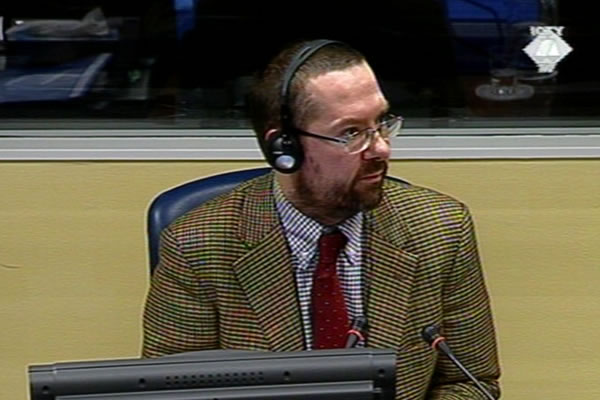Home
JNA WARNED OF CRIMES, LOCAL AUTHORITIES TURNED BLIND EYE
Prosecution expert notes that in 1991 the JNA warned the local authorities in the Serb Autonomous Region of Slavonia, Baranja and Western Srem about Serbs evicting, attacking and killing Croats and about many crimes and murders that remained unsolved. The authorities ignored the warning
 Christian Nielsen, witness at the Goran Hadzic trial
Christian Nielsen, witness at the Goran Hadzic trial The trial of Goran Hadzic, former prime minister of the Serb Autonomous Region Slavonia, Baranja and Western Srem, continued with the evidence of prosecution expert Christian Nielsen. Nielsen, who teaches Southeastern European studies at the University of Arhus in Denmark, used to work as an analyst for the OTP. Nielsen’s expert reports on the establishment and functioning of the Bosnian Serb police were admitted into evidence at three trials at the Tribunal.
In a report he wrote for the Hadzic trial, Nielsen covered in detail the historical and political developments in the former Yugoslavia and Croatia from 1990 to 1993. He also analyzed the structure of the interior ministry, primarily in the self-proclaimed Serb entities, in the same period. After the 1990 elections, Serbs were dismayed by the victory of the Croatian Democratic Union, Nielsen said. Serb politicians by and large used the stories of Serb people’s suffering in Croatia during the World War II to manipulate the people and to rally them around the Serbian Democratic Party. The party presented itself as the only legitimate protector of Serbs in Croatia. In Nielsen’s view, Franjo Tudjman’s war-mongering rhetoric contributed to the atmosphere of fear among Serbs. Many Serb politicians called all Croats Ustasha and the Croatian media described all Serbs as Chethniks and extremist nationalists.
In response to the Croatian aspirations to independence, Serbs started establishing their autonomous regions in Krajina, Slavonia, Baranja and Western Srem, and later Western Slavonia. Serbs wanted the autonomous regions to include all the areas with a Serb majority and the territories that in their view ‘historically belong to Serbs’, where Serbs were in a majority before April 1941.
The prosecutor noted that the Serb leaders in Croatia and Bosnia were on good terms, illustrating the claim with Momcilo Krajisnik’s letter of support and a recording of Milan Martic’s speech at a Krajina police parade, when he spoke about the significant contribution of the RSK MUP personnel to the operation to cut the Posavina corridor. As Martic said, President Goran Hadzic ordered them to fight there. In a brief speech, also played in court, Hadzic promoted Martic to the rank of general. Nielsen explained that the RSK president had the legal power to command the armed forces and to order a general mobilization. As Nielsen added, the RSK documents show that the police force was treated as part of the armed forces.
The prosecutor also showed several documents that were handed to the prosecution by the Republic of Serbia after Nielsen had completed his expert report. Analyzing the documents from late 1991 and early 1992, Nielsen spoke about the relationship between the civilian authorities and the JNA. In Nielsen’s opinion, the nature of the relationship depended on ‘the personality of the people involved’: whether they were in favor of dealing with the issue of Croats moving out and Serb refugees moving into the abandoned houses. In several documents, the JNA personnel refer to the unlawful eviction of Croats. They note that Serb refugees would move into ‘the first house they could get their hands on’ regardless of whether there was someone living there. The attacks on the Croats and other non-Serbs by the paramilitaries and a large number of unsolved murders were also discussed in the JNA reports.
Christian Nielsen will continue his evidence tomorrow.
